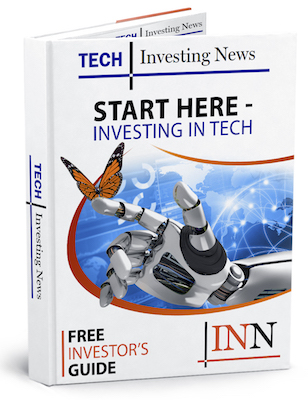
As the adoption of blockchain technology continues to edge further, a number of different use-cases are being applied and tested by major companies.
A growing chorus of companies and individuals are citing the benefits of blockchain technology, such as increased visibility, security, scale and speed and its major implications to a variety of industries.
Blockchain is currently applied to many well-known including , , , and .
Gary DeWaal, special counsel and blockchain expert at Katten Muchin Rosenman LLP, told the Investing News Network (INN) that blockchain technology brings disparate technologies together, essentially creating a more efficient application—like Henry Ford used the assembly line for the first time to bring together disparate parts of a car to create cars more efficiently and economically.
Industries from healthcare, manufacturing, insurance and finance are making strides in applying blockchain to their enterprise applications.
Brian Lio, CEO of blockchain research organization Smith + Crown, told INN that blockchain adoption is accelerating. For blockchain technology to gain greater adoption, the application of near-term real world use cases is essential to build further confidence in the technology and the , Lio further noted.
In line with this, the regulatory landscape for blockchain applications is advancing. DeWaal further noted that legislators are looking at how security interests can better be protected, the implications of maintaining records on a blockchain and the cybersecurity consequences of carrying this information.
As investment in blockchain development expands and the potential impact of blockchain broadens, INN takes a look at 7 Compelling Blockchain Use Cases By Industry and some of the companies behind these advancements.
1. Beverage
PepsiCo (NASDAQ:PEP)
PepsiCo underwent a trial blockchain ad campaign in partnership with Project Proton that resulted in a 28 percent increase in efficiency for costs applying to viewable impressions. The trial applied smart contracts, which verified the credibility of the impressions, ensuring they were genuine and fraud-free while in turn, improving ad efficiencies.
Here, Project Proton provides a transparent service, allowing companies to pay for ads that have actually been viewed, or deemed viewable, ultimately bringing more value to the advertiser.
Starbucks (NASDAQ:SBUX)
In partnership with Microsoft’s (NASDAQ:MSFT) Azure Blockchain Service, Starbucks is applying blockchain technology features in its mobile app. Here, the company traces the production of its coffee, from where it was grown to how it was roasted and details of its ethical sourcing process.
Starbucks and Microsoft state that these applications aim to provide greater visibility to coffee farmers. Additionally, it hopes to provide customers more information on their coffee purchases throughout the
2. Conglomerate
Reliance Industries (BOM:500325)
As one of India’s largest conglomerate holding companies, Reliance Industries is developing its own blockchain infrastructure for supply-chain logistics. In addition, it has released its own cryptocurrency JioCoin.
Blockchain was also utilized in a major financial transaction with HSBC (NYSE:HSBC). In this financial use case, Reliance Industries exported a shipment to a US customer. The transaction was executed by HSBC as the first financial transaction driven by blockchain in India.
Maersk (CO:MAERSK)
The largest shipping container company worldwide, Maersk is developing blockchain use-cases for the US430 billion marine insurance industry. In partnership with Microsoft, Ernst & Young and Willis Towers Watson (NASDAQ:WLTW) Maersk is working on solutions for tracking shipping container data in a secure and efficient manner. Enhancing the auditing elements of shipping containers was also integrated, to reduce the friction and timeliness involved in these processes.
3. Finance
JPMorgan (NYSE:JPM)
Designed for financial use cases, JPMorgan has developed a blockchain infrastructure called Quorum. This development was among the first of any major financial institution, allowing enterprises to process transactions privately and securely. Quorum is designed to help solve lengthy settlement times, help uncertainties in risk exposure, and improve compliance transparency in the market for financial services firms. In addition, it removes a number of financial intermediaries. Quorum is JPMorgan’s implementation of ethereum blockchain.
Microsoft (NASDAQ:MSFT) and JPMorgan entered a strategic partnership where Microsoft’s Azure Blockchain Service will support Quorum. As part of the partnership, Quorum “will become the first distributed ledger platform available through [the] Azure Blockchain Service, enabling J.P. Morgan and Microsoft customers to build and scale blockchain networks in the cloud,” the companies said in a press release.
Societe General (PA:GLE)
With headquarters in France, Societe General developed Societe Generale SFH, a covered bond security token that is built on ethereum blockchain. This is the first covered bond of its kind with Moody’s rating the covered bonds as AAA/aaa. Societe Generale issued 100 million EU worth of the bonds, all of which were subscribed.
Through this new issuance, Societe General stated that it hopes to explore increased efficiencies in settlement and transferring assets, while scaling up the transparency for covered bonds trading.
Barclays (LSE:BARC)
Barclay’s has been involved in a test trial for real estate transactions and payments with Instant Property Network and Royal Bank of Scotland (NYSE:RBS). The project reported that through the use of this technology, it could save the real estate industry US$160 billion. Applying blockchain technology in a distributed registry, results showed that the time to buy and sell real estate could drastically be reduced from three months time to complete (without blockchain technology) to three weeks time (with blockchain technology).
Barclay’s created Eagle Labs in 2015, which is focused on blockchain partnerships and business incubation.
4. Healthcare
HMS Holdings (NASDAQ:HMSY)
Our first blockchain use case is involves blockchain in healthcare. HMS Technologies, a healthcare provider to the US federal government, has partnered with blockchain healthcare startup Solve.Care. Together, the companies are working on solutions to reduce cost inefficiencies. The aim of the partnership is to improve care coordination, streamline disparate technologies and improve health data accessibility. HMS Technologies is a subsidiary of HMS Holdings.
5. Insurance
Marsh & McLennan (NYSE:MMC)
With operations in 130 countries, global insurance broker Marsh & McLennan will launch an automated blockchain-powered platform that allows its US commercial clients to access their certificates of insurance. Marsh will launch an app in line with this proof of insurance platform available 24 hours a day, broadening its client self-service features.
“Proof of insurance is a key business requirement for many industries. By vastly simplifying the process of obtaining certificates, we will enable clients to spend more time focused on the things that matter such as growing their business,” said Martin South, Marsh & McLennan’s president of US and Canada divisions.
6. Manufacturing
HTC Corporation (TPE:2498)
Taiwanese mobile company HTC launched a blockchain phone in May, which offers bitcoin node capacities and decentralized apps. In addition, the phone offers “secure enclave” features that can store crypto keys. This feature allows users to store crypto addresses in personal vaults on their phones, to prevent hackers from accessing them. The new phone has a wallet feature called Zion, which also allows users to store, request and send cryptocurrencies.
HTC is in the process of offering an affordable blockchain phone, estimated to be priced around US$250-300.
7. Technology
Samsung (KS:005930)
Samsung has launched a blockchain technology platform that offers users a host of use-cases. Nexledger Universal, its enterprise blockchain platform provides use-case applications including business-to-business (B2B) transactions, authentication and payment settlement services for businesses.
IBM (NYSE:IBM)
IBM is involved in a number of blockchain use-cases, notably:
IBM Food Trust Ecosystem: This applies blockchain technology to supply-chain management. Through its infrastructure, agriculture producers can track goods end-to-end, access this data in real-time, access insight on improving and understanding quality of goods, and sustainable source verifications. In addition, IBM Food Trust allows producers to reduce food waste and fraud through improved transparency within the supply chain.
SecureKey built on IBM Blockchain: Which was created to identity verification app Verify.Me that has been integrated by five major Canadian banks to allow customers to access their accounts through its identity verification infrastructure.
IBM Blockchain World Wire: Allows cross-border payments to be cleared and settled in a matter of seconds.
Tencent Holdings (OTC Pink:TCEHY)
In partnership with health insurance startup Waterdrop, Tencent Holdings is developing blockchain solutions for automating insurance reimbursements. Waterdrop is a unicorn startup based in China with 10 million customers the company reports.
Amazon (NASDAQ:AMZN)
Amazon Web Services (AWS), a subsidiary of Amazon, offers Amazon Managed Blockchain which allows enterprises and individuals to create their own blockchain network. What this means is that an individual or enterprise can set up a network that can include multiple accounts where members are able to make transactions and keep records of them without a central authority.
The Amazon Managed Blockchain can meet the demand of applications and transactions scaling into the millions. Amazon notes that its infrastructure can be applicable to industries including energy, logistics, retail and finance.
Kodak (NYSE:KODK)
Kodak developed a blockchain beta test to track ownership and license rights for photographers. Entitled KodakONE, this licensing platform in its beta testing announced that it generated US$1 million for photographic rights, hoping to create a new channel for photographers to earn more income from their work.
In tandem with this, Kodak is developing KodakCoin, a cryptocurrency network focused on a host of photographers needs, from licensing to tracking usage to more control over their income.
Don’t forget to follow us @INN_Technology for real-time news updates!
Securities Disclosure: I, Dorothy Neufeld, hold no direct investment interest in any company mentioned in this article.
Editorial Disclosure: The Investing News Network does not guarantee the accuracy or thoroughness of the information reported in the interviews it conducts. The opinions expressed in these interviews do not reflect the opinions of the Investing News Network and do not constitute investment advice. All readers are encouraged to perform their own due diligence.
http://platform.twitter.com/widgets.js





Be the first to comment